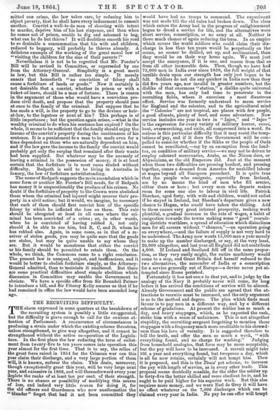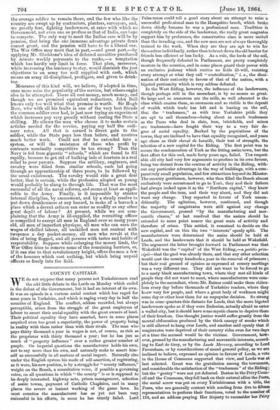THE RECRUITING DIFFICULTY.
THE alarm expressed in some quarters at the breakdown of the recruiting system is possibly a little exaggerated, but the difficulty is grave enough to call for the anxious at- tention of Parliament. A coneurrefice of circumstances is producing a strain under which the existing scheme threatens, unless strengthened, to give way altogether, and it cannot be strengthened without the active co-operation of the Legisla- ture. In the first place the law reducing the term of enlist- ment from twenty-five to ten years comes into operation this year almost for the first time. That is to say, the relics of the great force raised in 1854 for the Crimean war can this year claim their discharge, and a very large portion of them will, it is known, enforce the claim. This drain, moreover, though exceptionally great this year, will be very large next year, and excessive in 1868, and will thenceforward every year deplete the ranks of at least ten per cent. of their strength. There is no chance or possibility of modifying this source of loss, and indeed very little reason for doing it, for the old officers and Guardsmen who now anathematize the " blunder " forget that had it not been committed they would have had no troops to command. The experiment was not made till the old rules had broken down. The clue which enters the Army had in the progress of enlightenment begun to dread a service for life, and the alternatives were short service, conscription, or no army at all. Neither is there much chance of again reducing the term. In an empire which covers the world soldiers who could claim their dis- charge in less than ten years would be perpetually on the ocean, no sooner be drilled, set up, and acclimatized, than they would be on their way home again. We must just accept the annoyance, if it is one, and reason from that as from all other inexorable data. Then, though we have had 75,000 men in India ever since 1858, the full weight of that terrible drain upon our strength has only just begun to be felt. Soldiers do not die any quicker in India now than they did five years ago, nor invalid in greater numbers, but the dislike of that enormous "station," a dislike quite universal with the men, has only had time to penetrate to the recruiting fields, where it exercises a most disastrous effect. Service was formerly understood to mean service for England and the colonies, and to the agricultural mind the " Colonies " are not tropical, are places with few people, a good climate, plenty of beef, and some adventure. Now service includes one year in two in " Injee," and "Injee " is the expression for every variety of military horror, ennui, heat,- overmarching, and exile, all compressed into a word. So serious is this particular difficulty that it may resist the temp- tations of pay, and if it does the Government will be com- pelled to consider whether if the Sikhs or the people of Oude cannot be conciliated, --say by an exemption from the land- tax, on condition of military service—we may not he driven to employ coloured mercenaries, Arabs, as the Nizam does, or Abyssinians, as the old Emperors did. Just at the moment when these two difficulties are pressing hardest, and pressing together, comes a demand from America for unskilled labour at wages beyond all European precedent. It is quite true that the people who emigrate, especially from Ireland, are by no means the kind of men who fill armies, either there or here ; but every man who departs makes room for some one else to labour in civil life. Patrick Sheehan, aged forty, with wife and children, would not enlist if he stayed in Ireland, but Sheehan's departure gives a new chance to Hagan, who would have taken the shilling. Add to these causes very great internal prosperity, making work plentiful, a gradual increase in the rate of wages, a habit of emigration towards the towns making some "good" recruit- ing districts worthless, a spread of education which disinclines men for all careers without "chances,"—an operation going on everywhere,—and the failure of supply is not very hard to be understood. TheArmy now wants 15,000 men a year merely to make up the number discharged, or say, at the very least, 20,000 altogether, and last year all England did not contribute 4,000. If Ireland and Scotland fell off in the same propor- tion, as they very easily might, the entire machinery would come to a stop, and Great Britain find herself reduced to the two alternatives, the surrender of India or a conscription for a service generally out of Europe—a device never yet at- tempted since Rome perished. Fortunately it has not come to that yet, and to judge by the analogy of the Navy it probably never will come, for long before it has arrived the conditions of service will be altered. Already Government and the public are agreed that the at- tractions to recruits must be increased, and the only argument is as to the method and degree. The plan which finds most favour is to pay men in a different way, and by a different scheme of gradations. At present the soldier has so much a day, and heavy stoppages, which, as he expected the cash, strike him with a sense of unfairness. This is not altogether stupidity, the recruiting-sergeant forgetting to mention those stoppages with a frequency much more creditable to his shrewd- ness than his love of veracity. It is suggested therefore to tell the truth, and offer the men so much a week, "with everything found, and no charge for washing." Judging from household analogies, that form may be more acceptable, but the pay will have to be increased. A recruit might take 10/. a year and everything found, but twopence a day, which is all he now retains, certainly will not tempt him.. Then it is proposed, and this is the Times' pet scheme, to increase the pay with length of service, as in every other trade.This proposal seems decidedly sensible, for the older the soldier up to forty-five the better skilled and more obedient he is, and he ought to be paid higher for his superior work. But tins also requires more money, and we warn Earl de Grey it will have no effect whatever on the 7,000 discharges which can be claimed every year in India. No pay he can offer will tempt the average soldier to remain there, and the few who like the country are swept up by contractors, planters, surveyors, and, we greatly fear' fighting landowners, at rates with which no Government, not even one so profuse as that of India, can hope to compete. The only way to meet the Indian case will be by pension, that being the one immense advantage private firms cannot grant, and the pension will have to be a liberal one. The War Office may meet that in part,—and great part,—by applying Mr. Gladstone's idea of deferred annuities purchased by minute weekly payments to the ranks,—a temptation which has hardly any limit in force. That plan, moreover, while increasing the tendency to stay, would diminish the just objections to an army too well supplied with cash, which means an army ill-disciplined, profligate, and given to drink- ing.
Measures of this kind will, we believe, if adopted in time, once more raise the popularity of the service, but others ought ' also to be attempted. These all cost money, much money, and though we are promised equivalent reductions, John Bull knows only too well what that promise is worth. Sir Hugh Rose, who with all his faults is one of the very best friends the common soldier ever had, is just now trying an experiment Which increases pay very greatly without costing the State a shilling. He allows the men who choose it to make certain articles needed for the service, paying say half the ordi- nary rates. All that is earned is direct gain tb the soldier, while the State pays less than before, and receives much better work. Could not that be extended into a system, or will the resistance of those who profit by contracts nominally competitive be too strong? Then the Navy is fed from gigantic "schools," which are found to fill rapidly, because to get rid of hulking lads of fourteen is a real relief to poor parents. Suppose the artillery, engineers, and cavalry were filled from similar schools, each lad going through an apprenticeship of three years, to be followed by the usual enlistment. The cavalry would ride a great deal better, that is certain, while the profession adopted so young would probably be clung to through life. That was the most successful of all the naval reforms, and seems at least as appli- cable to the Army. Finally, is it impossible by stricter internal discipline, by amusement, and by a steady resolve to put down drunkenness at any hazard, to make of a barrack a place which a decent artizan can enter as readily as any other great depot of labour ? At present, while we are com- plaining that the Army is ill-supplied, the recruiting officer is compelled to except all men in England over so many years old, all men of imperfect physique, all men who can earn the wages of skilled labour, all unskilled men not content with twopence a day pocket-money, all men who revolt at the idea of being flogged, and all persons with tastes and habits of respectability. Suppose while enlarging the money limit, the War Office tries to remove some of the remaining barriers, or, if it can rise to that revolutionary height, offers the men a few of the honours which cost nothing, but which bring unpaid .officers so freely into the field.































 Previous page
Previous page